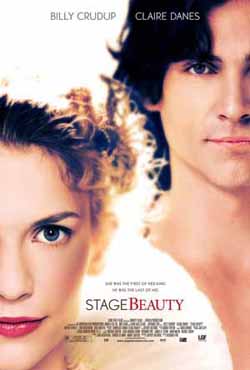 |
| Leonardo DiCaprio and Claire Danes in Romeo + Juliet |
Juliet: Claire Danes
Tybalt: John Leguizamo
Mercutio: Harold Perrineau
Father Laurence: Pete Postlethwaite
Fulgencio Capulet: Paul Sorvino
Ted Montague: Brian Dennehy
Dave Paris: Paul Rudd
Capt. Prince: Vondie Curtis-Hall
The Nurse: Miriam Margolyes
Apothecary: M. Emmet Walsh
Gloria Capulet: Diane Venora
Caroline Montague: Christina Pickles
Director: Baz Luhrmann
Screenplay: Craig Pearce, Baz Luhrmann
Based on a play by William Shakespeare
Cinematography: Donald McAlpine
Production design: Catherine Martin
Costume design: Kym Barrett
Roger Ebert hated it: "I have never seen anything remotely approaching the mess that this new punk version of Romeo & Juliet makes of Shakespeare's tragedy." But I kind of love it, and something tells me that Shakespeare would. After all, he wrote for a very mixed audience, ranging from people who admired lyric poetry to people who just wanted a little action, a little bawdry, and perhaps a good cry. Baz Luhrmann's version is Shakespeare for the multiplex. But Ebert makes a good point when he says "the movie lacks the nerve to cut entirely adrift from its literary roots." The problem with Romeo + Juliet (no, I don't know why the plus sign rather than "and" or ampersand) is Shakespeare: The text and the theatricality keep getting in the way of Luhrmann's cinematic impulses. He constantly has to work around the demands of Shakespeare's dialogue. Sometimes the workarounds are witty: I like the replacement of the prologue with a TV newscast, the change of the peacekeeping Prince Escalus to a cop called Capt. Prince, even the placement of Paris on the cover of Time as "Bachelor of the Year" -- though why wasn't he on People's cover as the "Sexiest Man Alive"? Even the change in weaponry is nicely handled: Obviously, contemporary gangbangers have to carry guns, and not the weapons specified in Shakespeare's dialogue, so instead of Colt and Glock, their guns have brand names like Sword, Dagger, and Rapier. There is also some wit in the performances: I particularly like the reimagining of Juliet's mother, whom Diane Venora plays as an aging trophy wife, not above doing a little flirting with Paris, her intended son-in-law. Harold Perrineau's portrayal of Mercutio as a drag queen also makes a good deal of sense, given the flamboyance of the character in the play. On the other hand, I don't know why we first see Father (not Friar) Laurence shirtless, delivering a botany lecture to some choir boys. Priestly pederasty was beginning to make headlines when the film was made, but a hint at Father Laurence's predilections doesn't seem relevant to his function in the story. On the whole, the film is best when it's full of action, drawing on the kind of energy that Luhrmann is known for, and it tends to sag in the love scenes. So maybe Romeo + Juliet is a mess, but it's an entertaining one -- and haven't we seen enough productions of the play that weren't?
Watched on Starz Encore Classics
